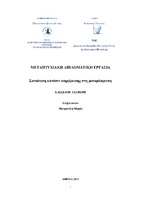| dc.contributor.advisor | Μητροσύλη-Ασημακοπούλου, Μαρία | |
| dc.contributor.author | Τζαφέρη, Κασσιανή | |
| dc.date.accessioned | 2021-04-19T10:42:58Z | |
| dc.date.available | 2021-04-19T10:42:58Z | |
| dc.date.issued | 2021-02 | |
| dc.identifier.uri | https://polynoe.lib.uniwa.gr/xmlui/handle/11400/579 | |
| dc.identifier.uri | http://dx.doi.org/10.26265/polynoe-430 | |
| dc.description.abstract | Η ιατρική αφορά σε ένα λειτούργημα, το οποίο ανέκαθεν στόχευε στην υγεία των ασθενών και στην βελτίωση της υγείας τους. Η μεταμόσχευση αφορά σε ένα από τα μεγαλύτερα επιτεύγματα του εν λόγω λειτουργήματος και αποτελεί την αφαίρεση ενός οργάνου ή ιστού από ένα υγιές ή νεκρό άτομο σε κάποιο άλλο, του οποίου η υγεία απειλείται. Όπως είναι φυσικό, μια τόσο δύσκολη και περίπλοκη επέμβαση, η οποία είναι σε θέση να χαρίσει τη ζωή σε έναν άνθρωπο, δεν γίνεται παρά να απαιτεί ορισμένες προϋποθέσεις για την πραγματοποίησή της. Οι δύο σημαντικότεροι παράγοντες για την καλύτερη δυνατή ολοκλήρωση μιας επέμβασης τέτοιου είδους, είναι από τη μία η ενημέρωση του ασθενούς και από την άλλη η συναίνεσή του. Η ενημέρωση αφορά σε μια πλήρη και σφαιρική ενημέρωση τόσο του δότη όσο και του λήπτη του μοσχεύματος σχετικά με οτιδήποτε αφορά στην όλη μεταμοσχευτική διαδικασία. Αμέσως μετά την ολοκλήρωση της ενημέρωσης, ο δότης και ο λήπτης είναι σε θέση να αποφασίσουν, εάν συναινούν ή όχι στην μεταμόσχευση. Όλη η ανωτέρω διαδικασία προστατεύεται τόσο από τη νομοθεσία όσο και από τον Κώδικα Ιατρικής Δεοντολογίας, τα οποία κατοχυρώνουν ολοκληρωτικά τα δικαιώματα του ασθενούς. Στην περίπτωση μιας μεταμόσχευσης, οι επαγγελματίες υγείας οφείλουν να σέβονται τα δικαιώματα του δότη και του λήπτη και κάθε ιατρική πράξη καλείται να βασίζεται στην ελεύθερη βούληση και αυτενέργεια τους. | el |
| dc.format.extent | 97 | el |
| dc.language.iso | el | el |
| dc.publisher | Πανεπιστήμιο Δυτικής Αττικής | el |
| dc.rights | Αναφορά Δημιουργού - Μη Εμπορική Χρήση - Παρόμοια Διανομή 4.0 Διεθνές | * |
| dc.rights | Attribution-NonCommercial-NoDerivatives 4.0 Διεθνές | * |
| dc.rights.uri | http://creativecommons.org/licenses/by-nc-nd/4.0/ | * |
| dc.subject | Μεταμόσχευση | el |
| dc.subject | Ενημέρωση | el |
| dc.subject | Συναίνεση | el |
| dc.subject | Ηθικά ζητήματα | el |
| dc.subject | Ηθικά διλήμματα | el |
| dc.title | Συναίνεση κατόπιν ενημέρωσης στη μεταμόσχευση | el |
| dc.title.alternative | Consent after notification to the transplant | el |
| dc.type | Μεταπτυχιακή διπλωματική εργασία | el |
| dc.contributor.committee | Γούλα, Ασπασία | |
| dc.contributor.committee | Σαρρής, Μάρκος | |
| dc.contributor.faculty | Σχολή Διοικητικών, Οικονομικών & Κοινωνικών Επιστημών | el |
| dc.contributor.department | Τμήμα Διοίκησης Επιχειρήσεων | el |
| dc.contributor.master | Διοίκηση και Διαχείριση Υπηρεσιών Υγείας και Κοινωνικής Φροντίδας | el |
| dc.description.abstracttranslated | Medical science in a function which has always aimed to improve the patients’ health. Transplantation is one of the greatest achievements of this function and is the removal of an organ or tissue from a healthy or dead person to another whose health is threatened. Naturally, such a difficult and complex operation, which is able to give life to a person, can only be done by requiring certain conditions for its realization. The two most important factors for the best possible completion of such an operation, are on the one hand the information of the patient and on the other hand his consent. The information refers to a complete and comprehensive information of both the donor and the recipient of the transplant about everything related to the whole transplant procedure. Immediately upon completion of the information, the donor and recipient are able to decide whether or not to consent to the transplant. The procedure mentioned above is protected by both the legislation and the Code of Medical Ethics, which fully guarantee the rights of the patient. In the case of a transplant, health professionals must respect the rights of the donor and the recipient, and any medical procedure is based on their free willingness and self-action. | el |


